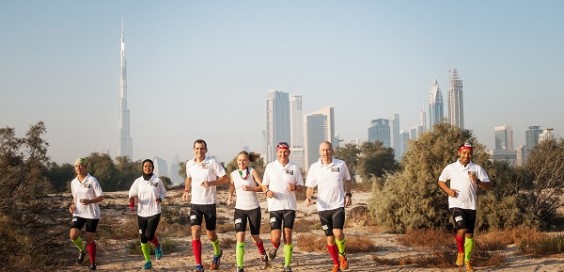Training For The 7Emirates Run
Written by The Sweat Shop // Sweat Challenge // Comments Off on Training For The 7Emirates Run

Seven athletes from the UAE will be running 12 marathons in 12 days as they race around the seven Emirates. We spoke to the female members of the 7Emirates Run team who will be taking on the desert, mountainous terrain and running through the most remote parts of the UAE to raise funds for charity.
The Dream Team (L to R): Doris Matlok, Aida Othman, Clemens Kastner, Deirdre O’Leary, Wendelin Lauxen, Servee Palmans, and Ekhman Mahmud. Image courtesy of Stu Williamson Photography
THE CHALLENGE
These seven athletes will be running 575km over 12 days, which means that they will be running 12 marathons back to back. The team will leave Abu Dhabi on 21 November and arrive at Downtown Dubai on National Day. The team will be faced with acres of tarmac as they race through the desert, but then the legs will really start to feel it when they reach the hilly area of Kalba. Running on an unmarked route and at the side of the motorway is going to be tough, but they will be able to swap some nights in their caravan for local hotels which are kindly sponsoring their run.
THE MOTIVATION
The money raised will be used to pay for life-changing surgery and post-operative medical support for Mohammad Ayoub, an 18-month old boy from Sharjah, who suffers from deformities to both legs. The 7Emirates Run team say they aim to change this little boy’s life forever.
THE RUNNERS
AIDA OTHMAN: “I’M PACKING A POSITIVE ATTITUDE”
MY STATS
“I completed my first single-stage ultra marathon distance 83km in southern Spain in October, but this is the first time I have taken part in a multi-stage run.”
MY TRAINING
“I wanted to build on base distance so I’ve been doing back-to-back runs. I’ll run six days a week and one of these sessions will be a long run. On top of this I’ve tried to slot in twice-weekly bootcamp session with Original Fitness Company for mixture of cardio endurance and muscle strength. I have also taken part in a yoga class every week to stretch out and increase my flexibility.”
MY KIT
“I will be packing my CEP running tight, compression calf for after run recovery, Yoga Tune Up Therapy Balls for self deep-tissue massage, Camelbak, my Capster headgear, plus a load of self belief and a positive attitude!”
MY FUEL
“My diet will stay pretty much the same, however, I will take on more protein and carbs (such as salmon, sweet potato and soba noodles). Breakfast will be banana and berry smoothie, or oats. I will carry nuts when I’m running and I will ensure that I stay hydrated and keep my sodium level up with electrolyte drinks. I’ve started making my own electrolyte drink with a mixture of water, Pink Himalayan salt, Tart Cherry juice and date syrup. It’s delicious.”
DEIDRE O’LEARY: “I’VE NEVER DONE ANYTHING LIKE THIS BEFORE”
MY STATS “I’ve never done anything like this! I’ve run a number of marathons – mainly around my own neighbourhood, preparing for the 7Emirates Run.”
MY TRAINING “My physiotherapist Pia is a Danish ultra- and adventure-racer. She very “kindly” devised a training programme for me that aimed for 120kms+ per week running.”
MY KIT “I’ll bring along some small mementos to remind me of how much encouragement I’ve had from friends and family, to help keep me going.”
MY FUEL “I’m very happy that the Sheraton Jumeirah is giving us a daily food drop-off so I don’t have to worry about what I’m eating. And I have taken the advice of my experienced ultra-marathon teammates to keep the diet the same as usual (so I’ll still be tucking into my favourite salt and vinegar crisps).”
DORIS MATLOK: “I’M RUNNING MOST DAYS”
MY STATS “I have participated in several ultra races, such as Racing the Planet’s Sahara Desert Race in Egypt, which I completed in October 2012. This was a 250km desert foot race, self supported, over seven days. I completed a similar race in June 2013 in the Gobi Desert in China. Self supported means that I had to carry all my equipment, change of clothes, food for 7 days, first aid kit, sleeping bag and so on for the entire 7 days. My backpack on day 1 weighed in at 9 kg for the Gobi Race. It was 12 kg at the start of the Sahara Race!”
MY TRAINING “I am running on most days, with longer runs on the weekend. I am also doing strength work, such as squats and core exercises, to keep my legs, hips and core strong and safe. I also make sure I use TriggerPoint therapy kit to roll out my fascia and muscles on most days.”
MY KIT “I won’t be taking any special pieces of kit, apart from my personal blister kit and maybe my TriggerPoint Grid roller!”
MY FUEL “I eat fairly clean anyway, so my food intake will be like my usual meals. This will mean lots of vegetables (steamed or raw in a salad), protein such as chicken, lamb or beef, some fruit (such as berries), and lots and lots of water. I also prefer unsweetened coconut water as a recovery drink – it tastes good and contains electolytes. While I am out on the road and running, I usually take my own trail mix with nuts, raisins, pumpkin seeds and some chopped up pieces of drywors (for the salt and protein). I don’t generally use race foods such as energy bars and gels. ”
To find out more or to donate visit www.7EmiratesRun.com.
0











Other places to find us online.